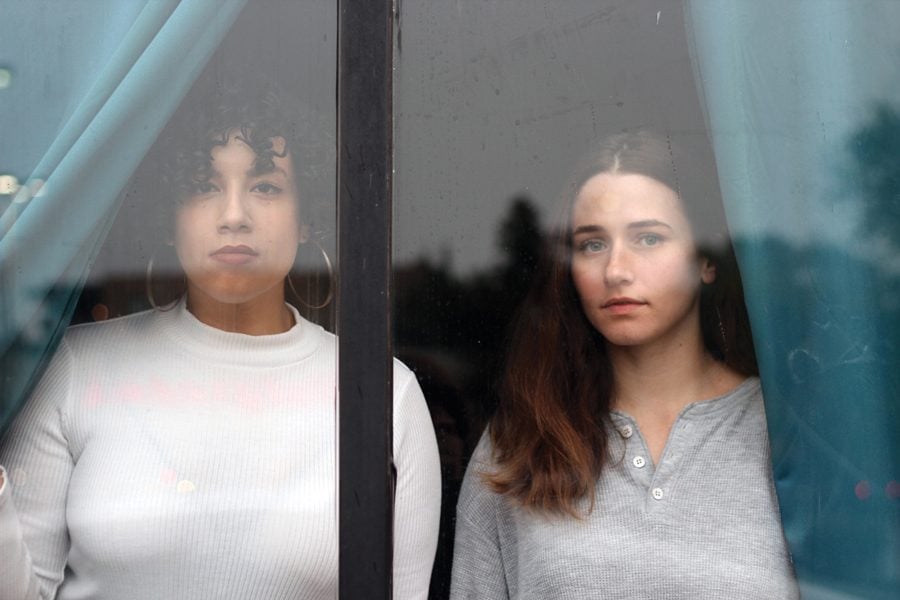“Proxy” explores the lingering effects of trauma through a true crime narrative
Northwestern alumnae Tessa Dettman (Communication ’17) and Carisa Gonzalez will star in “Proxy,” a new musical presented by Underscore Theatre Company. The show opens Oct. 22 and closes Nov. 24th at The Understudy
October 16, 2019
In 2014, two 12-year old girls from Waukesha, Wisconsin lured their friend into the woods, where they stabbed her 19 times. The attack gained national attention due to the unusual motive of the girls: to impress a popular internet urban legend “Slender Man,” and gain the privilege of becoming his servants, or “proxies.” The case became the inspiration behind an HBO documentary, a Netflix horror film and most recently, Underscore Theatre Company’s new musical, “Proxy.”
“Proxy” is a dark comedy that follows Vanessa, who, 15 years after the attack, works as a journalist and returns to her hometown to interview her former friend and attacker, Ronnie. While the details of the case, including names, have been changed, the basics of the incident remain the same. “Proxy” opens Oct. 22 and closes Nov. 24th at The Understudy, 4609 N Clark Street.
Northwestern alumnae Tessa Dettman (Communication ’17), who plays Ronnie, said “Proxy” explores the long-term effects of trauma through the lens of the often sensationalized story. She added that the characters in the play constantly struggle to deal with trauma in their own ways.
“Trauma isn’t just a static moment,” Dettman said. “It’s something that stays with you forever no matter what, and it’s not just you, it can affect anyone who’s connected to you. And I don’t know if anyone has ever figured out how we deal with that.”
Stephanie Rohr, who directed the production, shares this sentiment. In the play, both Vanessa’s brother and mother struggle to come to terms with Vanessa’s incident, which ended up fracturing the family’s relationships. Rohr added that the musical shows how families can overcome their shared trauma through their bonds.
“I’m interested in how families can heal from an event that far in the past, and what it takes each person doing for them to come back together and move forward,” Rohr said. “I’m not going to say there’s one way to do that, but I do think the show provides some good way the characters try to lean on each other and grow stronger.”
Aside from trauma, Rohr said the show provides a nuanced look at several other issues. For example, the musical explores how the internet affects Vanessa throughout her life, especially because her assault was the result of her friend’s interest in online creepypastas — viral online horror stories. As an adult, Vanessa writes for a clickbait website where she commodifies her trauma for likes and page views. “Proxy” doesn’t frame the internet in a singular way, but instead portrays its negatives and positives.
Rohr added that “Proxy” wants to portray Ronnie as somebody who is struggling with realistic issues rather than reducing her to an evil, crackling villain. The show contrasts Ronnie, who has been receiving therapy, with Vanessa, who isolated herself from others after the incident, to highlight the importance of seeking help to cope with your issues.
Carisa Gonzalez, who plays Vanessa, said to portray her character’s experiences, she tapped into her own personal childhood trauma alongside researching the actual case. Gonzalez said she hopes people leave the show more willing to examine and accept their own traumas.
“It is the very beginning of someone admitting they’re not okay, which is the first step, and sometimes the hardest,” Gonzalez said. “So it’s the process of the person getting to the point of admitting they are not okay, and haven’t been. And that’s really hard for a lot of people to do now. It’s the beginning of being aware of your mental health, and being aware that something needs to be done or needs to be changed to begin the journey to fix it.”
Email: wilsonchapman2021@u.northwestern.edu
Twitter: @wilsonchapman10



